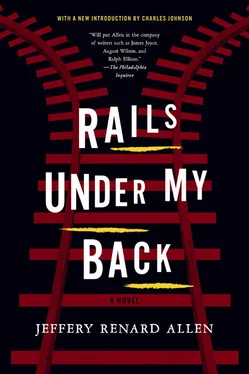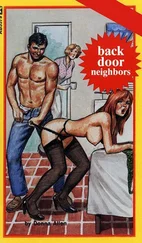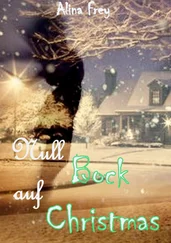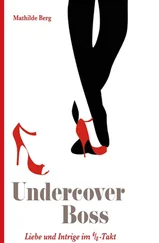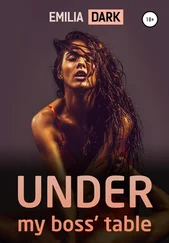Lula Mae entered the room. With much racket — Jesus required the impenetrable sleep of the dead — she unlatched it (strangely, it was not locked), opened the lid, and revealed the shining secret, a pack of Kool mentholated cigarettes. Lula Mae woke Jesus with a resounding slap. She held up the pack. Boy, she said. You too young to smoke.
Jesus looked at her, her palm print clear and red in his cheek of fossilized stone. Bitch, he said, just like that, you ain’t my mamma.
The early years, Red was closer to Hatch than his own skin. Gracie and Sheila dressed them the same for Sam’s funeral (viewing?).
Sam stands with one pants leg rolled up, offering his prized wooden stump for all the world to see. The stump moves with effortless, hidden will when he walks, like a hinged puppet limb. Stationary beneath him now as he mixes shaving cream in his old army helmet.
Yall niggas get bigger every time I see you. Soon I’m gon need me a chain saw to barber yall big heads.
My mammy say don’t use no straight razor, Hatch says.
Is yo mammy here? … I’ll cut you first since you got the brave mouth. Now hold still.
Sam works his sparkling straight razor between his fingers like a potato peeler. Shaves Hatch clean. Cleans Red the same. Two slick-bean twins.
Why you use that sword on my head? Red says. You ain’t sposed to be usin no spear on nobody’s head.
Hatch signed both of their names— Hatch Jones, Jesus Jones in the same hand — in the Visitors’ Book that slanted on a lectern under a remembered light. Dearly departed. In the scripted program, Hatch saw his great-aunts Beulah, Big Judy, Koot, and his grandmother Lula Mae listed as Sam’s survivors. Had Sam beached these women from the drowning waters? Had this dead man carried them — floating them on the log of his wooden leg — but allowed life’s tides to drag him into the dark drifting deep? Long ago, the dead man had planted himself in Hatch’s and Red’s hearts and grew; now, both of their heads yearned for the shining contents of the casket. Two faces and two eyes, they both peered into the coffin—
Touch him.
Nawl. You touch him.
Chicken.
Scaredy cat.
— hoping to view the undertaker’s stitches that had reattached Sam’s severed head.
She ain’t cut off his head, Dave said. Just buried that ax deep in it.
Like a log.
They found a bottle of Iron Ass next to his head. That’s how they knew it was his woman that’d done it.
Sam, if I’da just been there to lift up yo dyin head, Beulah said. You died too soon.
Damn, Hatch said. How old was he?
You died too young.
He was an ole-ass nigga.
Red, you be ole someday too.
Never.
Why was only one half of the casket — Sam’s stiff powdered bust — open to sight? To hide Sam’s wooden leg? Perhaps a bird had laid tiny eggs in his tree leg. He thought about Sam’s wooden leg, waxed and shiny like Sam’s dead skin — a birthday candle carrying the long, thick wick of Sam’s years. Who would inherit it?
Sam’s wood leg stomp so hard on the floor that his empty Old Rocking Chair bottles and his girlfriend’s Iron Ass bottles twink like chimes. Sam sit you in one chair, Red in another. Hand on hip, Porsha say, Uncle Sam, my mamma say, don’t you be usin no straight razor on they head. Sam pull the straight razor from the sheath of his blazer pocket. Uncle Sam, my mamma say —
Girl, you gon cut they hair? Sam run the razor once twice across his strop. Flip it over. Run it once twice across his strop. Then peel you and Red clean as apples.
Sometimes he would threaten to cut you and Red with the dead Jap sword he kept under the bed.
The next day, to lift their spirits, Uncle John took Hatch and Red to Fun Town — it was a satisfaction to take them about with him; This is my son. And that’s my nephew. My brother’s boy —the amusement park on Ninety-fifth and Stony Island. Three circus rings in a constant blur of motion with clowns, acrobats, and animals.
Nothing like Riverview used to be, Uncle John said. Boring. This might as well be the zoo.
Quick go-carts snapped popcorn sounds. A sweat-slick slide rolled your round butt like a ball bearing down five flights of friction — yes, you felt like a Coke bottle sliding down the chute of the red vending machine in Uncle John’s garage — and a Ferris wheel afforded a giant’s-eye view of Central and all the city’s five boxes.
The one at Coney Island is better, Uncle John said.
It would be the only view and visit, for the city vaporized Fun Town soon after. From then on, Uncle John — this horse of an uncle and father carrying the two of you piggyback — took you and Red to the traveling amusement parks — trucks arrive with the first blink of sunlight; skinny white trash unload them; the park is open for business before the last fingers of sun scratch the horizon — that occupied the vacant lots on Church Street, Stony Island, or Jeffery Boulevard.
YOU AND RED straddled broomsticks and rode (yes, straw-maned horses) the plains — Giddy-up! Giddy-up! — of the small apartment on Kenwood in Woodlawn. The two of you rode hard and fast on your bikes, knees bumping against chests, through the decaying streets of Woodlawn, Englewood, South Shore on a single, shared breath of oxygen. Your need to know stretched an invisible telephone wire through time and distance, connecting sleeping mouth to sleeping ear; you and Red passed dreams back and forth like a joint. Wind expanded the sails of your windbreaker jackets and sent you coasting along through the hood, light, weightless, never losing breath, a race of radiance, running, watching the world blur past, forgetting that you are running, one corner followed by another corner, one street by another street, wrapped in the silence of flight, wind lathering your faces with cool air, blowing. Fevered days followed again and again. At Rainbow Beach or Oak Street Beach you sought sun-filled life, rash physical joy. The air filled with conversation. Waves galloped in like horses, and the two of you lay for hours flat against hot sand — fine, like brown sugar, shaking it out of your toes; damp sand that absorbed red root life, bloodlines — and watched the sun through the huge waves.
Flooded by images of the Gemini moon landing, you and Red — at your suggestion — raced into Sheila’s garden, found two forked branches, and cut a circle in the grass so perfect you could have laid a foundation. Used the red of Sheila’s roses to magnify the circle. Stood inside the circle and waved at the men on the moon. The men waved back. Porsha— she wielded the body of a woman even then —chastised you and Red with keen slaps.
Balanced, the two of you frog-kicked at either end of a seesaw, gravity-free, astronauts frog-leaping over the moon.
Come on, Red, you said. Let’s get on the carousel.
Okay, Red said.
Bounced bowlegged to the carousel. You and Red grabbed the sides and ran with everything you had, shoving it, shoving, sending it around and around — Don’t yall go too fast on that thing, Porsha said — the images blurring in a stream of speed and motion, and hopped on, round and round with dizzy speed, four hands gripped tight to the iron bars, four arms stretched full, elbows locked, roiling, shaking back and forth, the spin of a potter’s wheel, you and Red leaning away from the center, heads all the way back, necks craned, straining the muscles, the world flicking swiftly in and out of vision, the steady backward rush of air, then Red sailing forth, cut from the line of motion, an astronaut sucked into outer space. You saw him for a moment, a moment lost in a blur of images. The carousel spun you back to the same spot. You let go too. Sailing. Landing. Your body cut a groove through the dirt. The two of you crying, more from fear than pain — later, Porsha treated a few nicks and scratches — and then an image waded into your wet sight. A double image. Your eyes tried to fix its outlines. What yall tryin to do? Porsha said. She smacked you. Smacked Red. Get me in trouble? Smacked you again. Smacked Red.
Читать дальше
